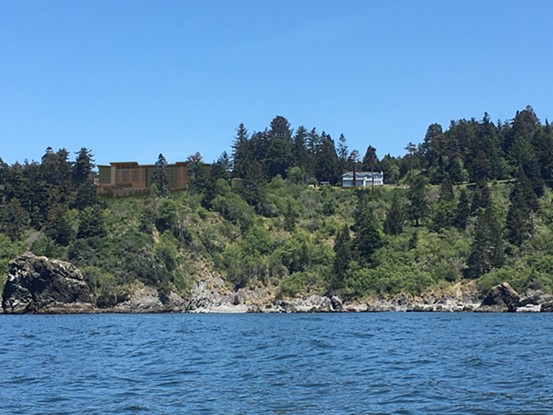News Blog
Coastal Commission to Re-hear Trinidad Hotel Project in August
The California Coastal Commission will again consider whether the hotel development proposed by the Trinidad Rancheria on the bluffs above Scenic Drive is consistent with state coastal protections when the commission meets in Eureka next month.
On June 12, an obviously conflicted commission voted 6-3 to object to the Bureau of Indian Affairs’ determination that the project is consistent with the California Coastal Act, largely due to questions surrounding where the hotel will get its water from. The rancheria has asked that the city of Trinidad supply water for the proposed 100-room hotel adjacent to Cher-Ae Heights Casino but the city has not yet committed and has several studies underway to determine whether the city’s water source — Luffenholtz Creek — has sufficient capacity to meet the city’s current and future needs along with those of the hotel.

Before the project came to a vote, commissioners lamented that the project was being heard before the water studies were complete and more than 700 miles away from the project site, with multiple commissioners noting there is tremendous public interest in the project. Multiple commissioners urged the Rancheria to resubmit the project to be heard again in Eureka hopefully the water questions would be answered by then.
The Trinidad Rancheria has proposed the five-story hotel project as a way to spur economic development to what Tribal Chair Garth Sundberg described to the commission as a small tribe with a high unemployment rate and “tremendous needs.” But the project has drawn concern from some in the surrounding community who feel it could have negative impacts on traffic, the city’s water supply and the scenic nature of the area, pointing out that it would be the tallest structure in the surrounding 20 miles.
But the project is not subject to local zoning regulations because the Trinidad Rancheria is a sovereign nation, which means it falls under the purview of the BIA and is subject to a federal environmental review process. As a part of that process, the BIA must determine whether it would be consistent with the California Coastal Act, a determination that the commission then can concur with or object to. If the commission disagrees with the BIA’s assessment, the bureau can proceed anyway but must offer a thorough explanation of why it disagrees, a path that leaves the decision susceptible to a legal challenge. Or the agencies can enter into non-binding mediation.
In this case the bureau has decided not to proceed against the commission’s objection and — at the request of the Trinidad Rancheria, according to the CEO of its development corporation, David Tyson — resubmitted the project for consideration earlier this month. Commission Public Information Officer Noaki Schwartz said in an email to the Journal that the commission will hear the matter at its Aug. 8 meeting in Eureka. She said the proposed project “materially hasn’t changed” since being heard last month.
On June 12, an obviously conflicted commission voted 6-3 to object to the Bureau of Indian Affairs’ determination that the project is consistent with the California Coastal Act, largely due to questions surrounding where the hotel will get its water from. The rancheria has asked that the city of Trinidad supply water for the proposed 100-room hotel adjacent to Cher-Ae Heights Casino but the city has not yet committed and has several studies underway to determine whether the city’s water source — Luffenholtz Creek — has sufficient capacity to meet the city’s current and future needs along with those of the hotel.

- Trinidad Rancheria
- An artistic rendering created by the Trinidad Rancheria of what its proposed Scenic Drive hotel project would look like from Trinidad Bay.
Before the project came to a vote, commissioners lamented that the project was being heard before the water studies were complete and more than 700 miles away from the project site, with multiple commissioners noting there is tremendous public interest in the project. Multiple commissioners urged the Rancheria to resubmit the project to be heard again in Eureka hopefully the water questions would be answered by then.
The Trinidad Rancheria has proposed the five-story hotel project as a way to spur economic development to what Tribal Chair Garth Sundberg described to the commission as a small tribe with a high unemployment rate and “tremendous needs.” But the project has drawn concern from some in the surrounding community who feel it could have negative impacts on traffic, the city’s water supply and the scenic nature of the area, pointing out that it would be the tallest structure in the surrounding 20 miles.
But the project is not subject to local zoning regulations because the Trinidad Rancheria is a sovereign nation, which means it falls under the purview of the BIA and is subject to a federal environmental review process. As a part of that process, the BIA must determine whether it would be consistent with the California Coastal Act, a determination that the commission then can concur with or object to. If the commission disagrees with the BIA’s assessment, the bureau can proceed anyway but must offer a thorough explanation of why it disagrees, a path that leaves the decision susceptible to a legal challenge. Or the agencies can enter into non-binding mediation.
In this case the bureau has decided not to proceed against the commission’s objection and — at the request of the Trinidad Rancheria, according to the CEO of its development corporation, David Tyson — resubmitted the project for consideration earlier this month. Commission Public Information Officer Noaki Schwartz said in an email to the Journal that the commission will hear the matter at its Aug. 8 meeting in Eureka. She said the proposed project “materially hasn’t changed” since being heard last month.
Comments
Showing 1-1 of 1